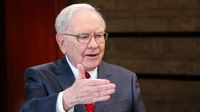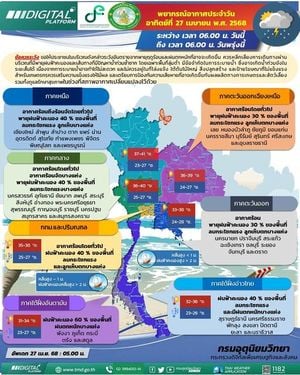The global stock markets are currently in a state of panic, leaving investors wondering what actions to take. In such turbulent times, who better to turn to for advice than Warren Buffett, the most successful investor of our time? With his decades of experience, Buffett's insights on navigating market crashes are invaluable, especially as he warns against making emotional decisions.
At 94 years old, Warren Buffett is often referred to as the "Oracle of Omaha" for good reason. His investment strategies have consistently outperformed the market over the years. Notably, even amid the current market turmoil, shares of his company, Berkshire Hathaway, have held up relatively well compared to the broader market. This resilience demonstrates Buffett's ability to remain unfazed by short-term panic, a quality he encourages other investors to adopt.
In a recent interview shared by Chamath Palihapitiya, founder and CEO of Social Capital, Buffett emphasized the importance of maintaining composure during market downturns. He stated, "If you do stupid things because the stock is falling, you shouldn’t own stocks at all... Some people are emotionally or psychologically unable to own stocks." This statement underscores Buffett's belief that emotional reactions can lead investors to make hasty decisions that ultimately result in losses.
Buffett's philosophy remains consistent: panic selling only solidifies losses. Investors who remain calm and focus on quality investments are more likely to reap rewards in the long run. Historical trends show that after every crash, a recovery follows, and patient investors emerge victorious. His message is clear: not every market fluctuation necessitates a reaction. Those who have solid companies in their portfolios should trust them during challenging times and avoid acting impulsively.
On April 9, 2025, discussions around Buffett's investment strategies intensified as reports highlighted the contrasting performances of BYD and Tesla. While Tesla faced declining sales, Buffett's investment in BYD has proven lucrative. Specifically, Tesla's deliveries fell by about 13 percent year-on-year in the first quarter, with the company delivering 336,681 vehicles, significantly below analyst expectations. This decline is attributed to the transition to a new generation of the Model Y and production challenges, with Tesla producing 16 percent fewer vehicles than in the same period last year.
In stark contrast, BYD reported a remarkable increase in sales, delivering 377,420 vehicles in March alone—a 24.8 percent increase compared to the previous year. In the first quarter, BYD delivered a total of 1,000,804 New Energy Vehicles (NEVs), marking a staggering 59.8 percent increase. This surge positions BYD ahead of Tesla, as the company also delivered 416,388 all-electric vehicles in the same timeframe.
BYD's success is attributed to its innovative Blade battery technology, which is recognized as the safest tested EV battery. Additionally, the company recently launched its "God's Eye" autonomous driving system, which is included as standard on its affordable Seagull Hatchback. In comparison, Tesla charges around $15,000 for its Full Self-Driving software, which is currently under scrutiny by Chinese authorities.
Buffett's foresight in investing in BYD has proven beneficial. Back in 2008, Berkshire Hathaway quietly acquired 225 million shares of BYD for approximately $230 million, securing nearly 10 percent of the company. Today, that investment is valued at between six to eight billion dollars, representing a 25 to 30-fold increase. Despite Berkshire Hathaway reducing its stake to five percent by mid-2024, Buffett reaffirmed his enthusiasm for BYD at the 2024 Berkshire Annual Meeting, stating, "Charlie [Munger] knocked twice on the table... and said, 'Buy BYD.' He was right—in a big way."
However, not all of Buffett's investments have been smooth sailing. His significant stake in Occidental Petroleum has raised eyebrows. As of April 10, 2025, Berkshire Hathaway owns 28 percent of the oil company, with an average entry price of around $53 per share. Currently, the stock trades at approximately $40, having dipped as low as $35 during a market crash triggered by Trump's tariff announcements. This has resulted in a staggering book loss of over $5 billion for Berkshire.
Occidental is burdened with a hefty debt of $24 billion, leading analysts to question CEO Vicki Hollub's goal of reducing net debt to $15 billion by 2027. While Berkshire earns around $700 million annually from preferred dividends that Occidental must pay, the situation presents a peculiar dilemma for Buffett, who is known for his cautious risk management.
Speculation abounds regarding whether Buffett will fully acquire Occidental at its current price, which would cost around $35 billion—just a fraction of Berkshire's substantial cash reserves. Although Buffett has previously dismissed such intentions, the recent stock price decline may prompt him to reconsider. Recent purchases were made at nearly $47, suggesting that Buffett might be tempted to buy more shares, signaling confidence not only to his investors but also to the broader market.
Buffett's challenges extend beyond Occidental. His investment in Apple has also incurred significant losses, with around $20 billion in book losses reported. Despite this, Apple remains a strong company, unlike Occidental, which faces operational struggles and a high debt load. This situation illustrates that even the most seasoned investors can face challenges, and sometimes instinct can outweigh analytical assessments.
As the markets continue to fluctuate, Warren Buffett's advice rings true: maintaining a level head and focusing on long-term strategies is crucial for navigating turbulent times. Investors would do well to heed his insights and avoid the pitfalls of emotional decision-making.






